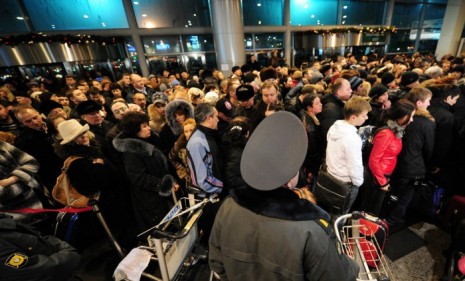What the Moscow bombings mean for airport security
In the wake of Monday's deadly bombing at Russia's Domodedovo airport, commentators are debating the repercussions for other travelers around the world

A free daily email with the biggest news stories of the day – and the best features from TheWeek.com
You are now subscribed
Your newsletter sign-up was successful
After Monday's deadly suicide bombing at Moscow's busy Domodedovo airport, in which at least 35 people were killed and another 180 wounded, Russian President Dmitri Medvedev is blaming terrorists. But he also criticized the airport's management, saying that the incident revealed violations of security procedures. Which raises the question, how will the bombing affect airport security in Russia — and the rest of the world? (See the aftermath of the airport bombing)
More security at the arrivals area
The attackers bombed the arrivals hall, which, in most airports, has a greater concentration of people than the departures area, but is less actively policed. "The security emphasis has always been on departures, not arrivals; now that's going to have to be rethought," says security analyst Will Geddes, as quoted by CNN.
The Week
Escape your echo chamber. Get the facts behind the news, plus analysis from multiple perspectives.

Sign up for The Week's Free Newsletters
From our morning news briefing to a weekly Good News Newsletter, get the best of The Week delivered directly to your inbox.
From our morning news briefing to a weekly Good News Newsletter, get the best of The Week delivered directly to your inbox.
A spike in passenger profiling
"It is not practical to check everyone coming into the airport meet-and-greet area," says security expert Norman Shanks in The Guardian. The only sensible solution is "passenger profiling," says Philip Baum, the editor of Aviation Security International. Having airport security stay on the lookout "for people that don't fit in, that seem to be out of place," is "the only proven method...." London's Heathrow is already testing a "behavioral profiling" program. Of course, says Shanks, if a bomber realizes he's been spotted, he could set off his device when he's still surrounded by plenty of innocent people.
Barring non-traveling visitors to the airport
If airports are really serious about safety, says CNN's Richard Quest, they will extend the "ticketed passengers only zone" — pushing it back to the airport door or even to some point on the road that leads up to the terminal. That's what Israel does at Ben Gurion Airport, says Access Control and Security Systems magazine. "All vehicles traveling on airport access roads must stop at booths staffed by security people," and it's no coincidence that "Ben Gurion has experienced no serious terrorist incidents for more than 30 years."
A free daily email with the biggest news stories of the day – and the best features from TheWeek.com
Better management at Russian airports... soon
Russia is bizarrely "unconcerned with personal and public safety," says Masha Gessen in Slate. Its airport scanners are usually in "'standby mode,' which is to say, turned off." Worse, it's become clear that, in this case, "the airport's management had known of a planned terrorist attack at least a week ahead of time," right down to the location. What did they do? Nothing. America's TSA had come in for its share of domestic criticism, but Medvedev praised U.S. airport security as "meticulous," reports RIA Novosti.
Whatever we do will be an over-reaction
Clearly, "air travel continues to be the target of choice for high-profile terrorist bombings," says Patrick Smith in Salon. But "this has been the case for decades," and "more barricades and scanners and cameras and automatic weapons" won't change that. It's a given that we need thorough security, but let's keep it "rational." The "reality is that we can never make our airports, or any other crowded places, impervious to attack."
-
 The ‘ravenous’ demand for Cornish minerals
The ‘ravenous’ demand for Cornish mineralsUnder the Radar Growing need for critical minerals to power tech has intensified ‘appetite’ for lithium, which could be a ‘huge boon’ for local economy
-
 Why are election experts taking Trump’s midterm threats seriously?
Why are election experts taking Trump’s midterm threats seriously?IN THE SPOTLIGHT As the president muses about polling place deployments and a centralized electoral system aimed at one-party control, lawmakers are taking this administration at its word
-
 ‘Restaurateurs have become millionaires’
‘Restaurateurs have become millionaires’Instant Opinion Opinion, comment and editorials of the day